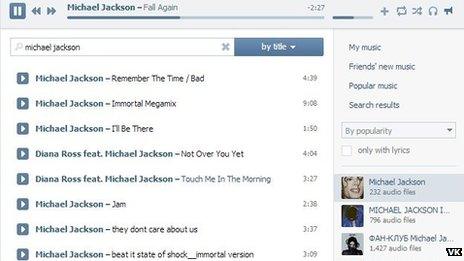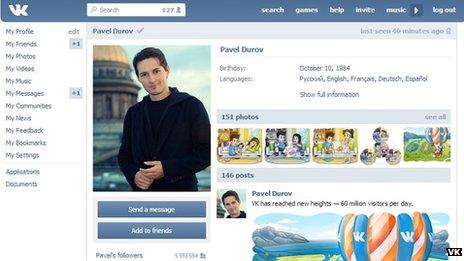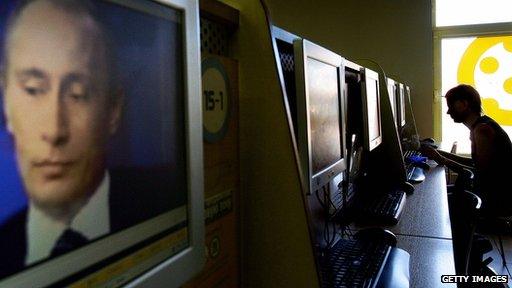VKontakte case puts Russian music piracy into spotlight
- Published

VKontakte allows users to upload and share content
Three major record labels - Sony Music Russia, Universal Music Russia and Warner Music UK - were in court on Monday, suing Russian social media site VKontakte (VK) for "large-scale" music piracy.
Dubbed "Russia's Facebook", VK allows users to upload music and videos but is accused of refusing to strike licensing deals with rights holders.
After months of delays, the case finally went before a judge at the St Petersburg and Leningrad region arbitration court. But this legal battle looks set to be a long one.
Although the labels originally filed separate actions, the court ruled that instead they will be heard as one consolidated case. A series of substantive hearings will begin on 8 September, and is expected to run into October.
The fact remains that after numerous warnings, the music industry has run out of patience with VK. As well as suing for £1m in damages, the labels want an order requiring VK to implement fingerprinting technology to delete copyrighted works and prevent them from being re-uploaded.
NFMI and IFPI are the local and global industry organisations working with the labels. "VK's music service, unlike others in Russia, is an unlicensed file-sharing service, designed for copyright infringement on a large scale," says Frances Moore, IFPI chief executive.
"We have repeatedly highlighted this problem over a long period of time. We have encouraged VK to cease its infringements and negotiate with record companies to become a licensed service. To date the company has taken no meaningful steps to tackle the problem."
Hurting competitors
VK has over 88 million users in Russia - and 143 million globally. It is the second most popular site in Russia and the 22nd most popular site worldwide.
VK's actions have been defended by founder Pavel Durov, known to support piracy and believe in the freedom of sharing.

Pavel Durov launched VKontakte in 2006
There's little doubt that licensed digital music services in Russia, including local players Yandex, Trava and global services iTunes and Deezer, pay a price for the widespread piracy. According to IFPI, growth of licensed digital services in Russia is only $0.50 per capita; the European average is $8.40.
And while recorded music revenues in 2013 totalled 2.2bn Russian roubles ($61m; £36.4m), this figure could be even bigger. Russia has the potential to be a top 10 world market, but is currently ranked outside the top 20 international music markets.
As the largest social network in Russia, VK's unlicensed service is a significant factor in this under-performance.
"VK hurt competitors because they are not paying anyone for anything - you cannot compete with that," says Frances Moore.
International discontent
IFPI is not alone in believing that VK is harming the Russian online music industry. In January, the Office of the US Trade Representative (USTR) identified VK as one of the most "notorious markets" for piracy for the fourth consecutive time.
Since 2000, Russia has been a mainstay on the USTR's "Priority Watch List" in its Special 301 Report, external, backed by industry claims of billions lost by US companies in software, music, and film piracy.
The USTR cannot do anything beyond identifying foreign countries that deny adequate and effective protection of intellectual property rights and seek to negotiate.
But it serves to demonstrate the scale of discontent on the world stage with Russia's lack of action on this issue.
Controversial company
Controversy and VK are never far apart. From offering a job to Edward Snowden, external, the NSA whistleblower, after he was granted temporary asylum in Russia, to allowing homophobic groups like Occupy Paedophilia to operate on its site. Occupy Paedophilia has been found to use VK to lure gay men to places where they would be attacked, external.
The lawsuits follow a particularly sensitive time for VK.
Mr Durov left the company and the country in April on acrimonious terms, amid alleged pressure from the site's Kremlin-linked owners after VK's ownership structure changed in 2013.
Mr Durov had previously refused to close down groups on VK organising protest marches against Russian President Vladimir Putin.

VK has adopted the same colour scheme as Facebook and also allows users to "like" posts and comments
VK does not deny the similarities with Facebook. But the major difference between the two networks is their attitude towards copyright laws.
The music industry has challenged VK before. For instance, its vociferous piracy appetite was targeted in 2004-05 but became expensive and little was achieved.
Russia passed a strict anti-piracy law in August last year, regulating online distribution of films and TV series in Russia. Two other bills have since expanded the law to other types of content, including music, photos, books and software.
But not everyone has welcomed it. A potential outcome is the blocking of entire domains, even if only one page hosts illegal content.
'Entrenched'
The VK case highlights the widespread problem of music piracy in Russia.
A cursory trawl of Russian internet forums, questioning the last film or album purchase elicits an unsurprising response - why spend money on something you can get for free?
Income in Russia means a CD or a film costing about $10 is out of reach, so piracy - rarely recognised as that - is an added incentive to use sites like VK.

President Putin signed an anti-piracy bill into law last year
Joe Karaganis, an expert in media piracy, co-authored a report into media piracy in emerging economies, external. He says the concept of unauthorised copying as an illegal activity has been slow to emerge in Russia.
"Part of the problem is that 'piracy' is so entrenched in Russia's consumer culture," he explains. "After the fall of the Soviet Union, many western cultural goods were unavailable at any price, much less at prices most Russians could afford.
"As a result, many of the forms of unauthorised copying and collecting that were common in the Soviet era survived and grew, driven by market failure and cheap consumer tech, rather than official censorship."
Consequently, pirated CDs and videos flooded the market.
Mr Karaganis suggests the scale of damages being sought reflects an industry desire for VK to enter into a licensing deal.
"This case is not about an imminent threat to music revenues, but an attempt to create a foundation for the longer term. The damages claimed are miniscule - the labels want to cut a deal, effectively letting VK carry the risk," he says.
A deal would leave the record labels in the driving seat - controlling their releases and artists - and would afford VK the rights in Russia where perhaps they know the market better. So the artist would get more promotion together with a sizeable cash injection for the labels.
Whatever the outcome of the court case, record companies want to develop a thriving licensed music business in Russia. If successful, consumers will have access to music via different licensed channels and formats. And Russia will move ever closer to an open, competitive music market.
- Published22 April 2014

- Published3 April 2014

- Published17 April 2013
